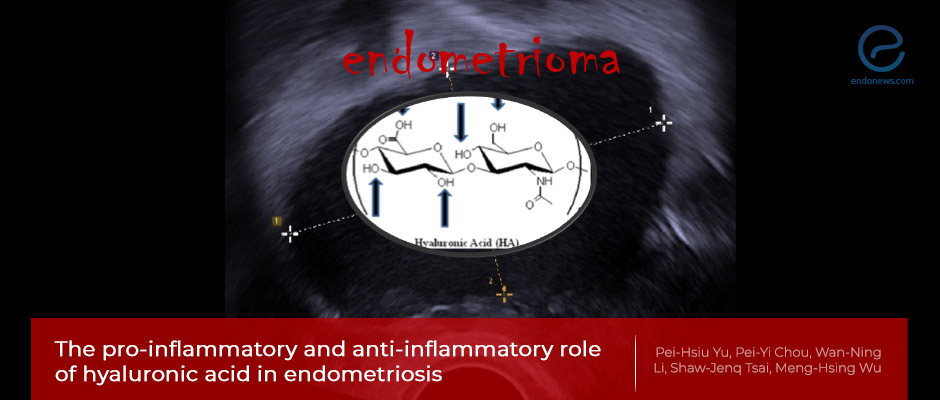Does hyaluronic acid have a role in endometriosis?
Aug 9, 2021
Hyaluronic acid and endometriosis
Key Points
Highlights:
- It seems that Hyaluronic acid may have the ability to inhibit endometriosis formation, but it may also have a role in promoting the inflammation process during clinical use.
What’s done here:
- Peritoneal fluid and endometrioma samples were collected during surgical proceduresalong with control group.
- The hyaluronic acid amount was measured in the collected fluids.
- Endometriotic stromal cells were isolated and treated with IL-1β and hyaluronic acid, and the expression of COX-2 was evaluated.
- A mice model of endometriosis was established, treated with hyaluronic acid, and endometriotic foci were microscopically assessed.
Key results:
- Hyaluronic acid levels were similar in control and endometriosis group, but the hyaluronic acid or IL-1β treatment increased COX-2 in endometrial stromal cells.
- After treating the endometriotic stromal cells with hyaluronic acid in the presence of IL-1β, COX2 expression increased significantly.
- Endometriotic lesion size was reduced in mice treated with hyaluronic acid.
Limitations of the study design
- Rather than the amount of hyaluronic acid, its type and molecular weight could be important for further analysis.
- Different molecular weight hyaluronic acids have different biochemical functions.
- The hyaluronic acid produced by peritoneal mesothelial cells which is mainly high molecular has an anti-inflammatory and thus protective effect.
Lay Summary
Pei-Hsiu Yu and associates from Tainan, Taiwan, published their results of original research on the role of hyaluronic acid in endometriosis formation in a recent issue of "Taiwanese Journal of Obstetrics and Gynecology".
Hyaluronic acid, a glycosaminoglycan protein in the extracellular matrix, is a useful anti-adhesive agent applied after laparoscopic surgery for endometriosis. Hyaluronic acid functions like hyaline cartilage protection in clinical use and anti-inflammatory effect on reducing proinflammatory cytokines. Exogenous hyaluronic acid is a useful anti-adhesive agent in preventing the formation of adhesions after laparoscopic surgery for endometriosis. Hasegawa et al. earlier reported that the use of hyaluronic acid reagent significantly reduced endometriosis lesions in laboratory mice. There is a contradictory case report about acute inflammatory reaction following use of hyaluronic acid derivate product in gynecologic surgery for adhesion prevention which needed further surgical intervention.
This current research aimed to investigate the paradoxical role of hyaluronic acid in the inflammatory process during endometriosis. Peritoneal fluids and lesions of endometrioma were collected during surgical procedures and hyaluronic acid was measured. Besides isolated endometriotic stromal cells were treated with IL-1β and hyaluronic acid, and expression of COX-2 was evaluated. Furthermore, the effect of hyaluronic acid in a mice model of endometriosis was evaluated.
The levels of hyaluronic acid in the peritoneal fluid was same between normal, early, and advanced-stage endometriosis groups. After treating the endometriotic stromal cells with hyaluronic acid in the presence of IL-1β, COX2 expression increased significantly. The size of endometriotic lesions was also reduced in mice treated with higher concentration hyaluronic acid.
The authors speculate that hyaluronic acid posess a proinflammatory effect in the acute phase and an anti-inflammatory effect in the chronic phase of endometriosis. This could explain the paradox between microscopic and macroscopic results besides early severe inflammatory reactions in clinical settings. There is a need for further detailed studies to better understanding the key role of hyaluronic acid involvement in endometriosis pathogenesis.
Research Source: https://pubmed.ncbi.nlm.nih.gov/34247812/
Endometriosis hyaluronic acid inflammation

